EXECUTIVE SUMMARY
The Center for Research and Security Studies (CRSS) and Organization for Economic Studies and Peace (OESP) held an inaugural conference for Pak-Afghan Women Parliamentarians on January 28, 2021 at Serena Hotel, Islamabad. During the last couple of years, both CRSS and OESP have been working towards the increased involvement of women in regional processes, both by involving women in the Beyond Boundaries Track II process and by setting up additional initiatives that would act as a dedicated platform for women’s participation. This activity was meant to set the stage for future collaboration. The main aim of this conference was to provide a platform for women in the Afghan parliament to interact and collaborate on issues of mutual interest with their Pakistani counterparts, and devise recommendations that would support women’s involvement in shaping bilateral relations between both countries.
The conference participants were quite delighted that such an initiative has taken place during this time when both countries are enjoying cordial relations. Furthermore, the legislators were of the view that such events should not be one-off occurrence. The continuation of such dialogues is vital in order to have a lasting impact and attain the planned outcomes. Additionally, they agreed to share experiences, contextual knowledges and impart trainings to one another wherever essential.
KEY TAKEAWAY POINTS
The Pak-Afghan Women’s Parliamentarians conference revealed some significant takeaway points that can enlighten the Action Plan developed by the Consortium for strengthening regional connectivity. These points are summarized below.
- The women parliamentarians have recommended the formation of a bilateral group, Women Parliamentarians without Borders. Through this joint forum, several regional challenges could be dealt with in an appropriate manner.
- Women parliamentarians must be involved in the ongoing peace process as they will ensure the inclusion of the rights of women and children whilst negotiating with all relevant stakeholders.
- The participants of the conference vocalized the collective opinion with regards to the need of a collaboration between both countries in the field of health and education.
- The Afghan participants have urged the Pakistani members to assist in replicating the country’s financial inclusion plans in Afghanistan as well.
- Through this platform, the participants recommended to hold webinars on focused thematic areas involving women parliamentarians to discuss challenges and recommend solutions for them. These regular engagements will increase the parliamentarians’ network and will aid in resolving any prevalent challenges.
MAIN EVENT REPORT
A high-level seven-member delegation, headed by Member of Afghan Parliament, Shinkai Karokhail, arrived in Islamabad on January 27, 2021 to discuss issues of bilateral interest with the Pakistani delegation in a bid to devise recommendations to present to both governments. The other members of the Afghan Parliament in the delegation included: Fatima Kohestani, Farzana Kochai, Shirini Mohseni, Zara Tokhil Zabuli, Halima Askari and Abdul Rehman, Project Coordinator, OESP. Along with the delegation, the Ambassador of Afghanistan to Pakistan, His Excellency Mr. Najibullah Alikhil, also attended the conference alongside senior diplomats from the Afghan embassy.
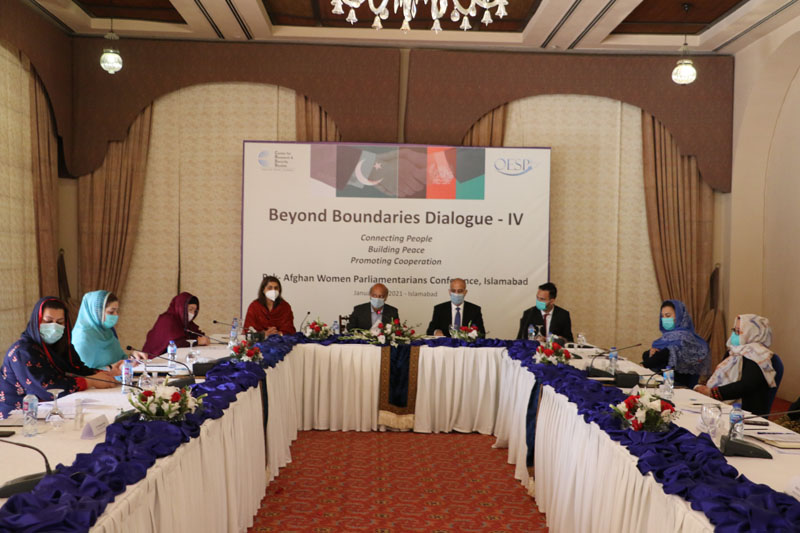
The Pakistani delegation was headed by Member National Assembly (MNA) Shandana Gulzar. Other female members included: Dr. Sania Nishtar; SAPM on Poverty Alleviation and Social Safety, Dr. Nausheen Hamid; Parliamentary Secretary for Ministry of National Health Services, Regulation and Coordination, MNA Nafeesa Khattak, MNA Dr. Aisha Ghous Pasha, MNA Mehnaz Akber Aziz, MNA Uzma Riaz Jadoon, MNA Zille Huma, MNA Shaheen Saifullah Toru, Senator Dr. Mehar Taj, Senator Sana Jamali, and Barrister Sahar Sulaiman, Legal Advisor to Speaker National Assembly.
The visit started with a dinner hosted by CRSS for the Afghan and Pakistan delegations at Serena Hotel on January 27, 2021.
On January 28, 2021, during the inaugural session, Executive Director CRSS Imtiaz Gul, welcomed all the honorable participants and thanked them for sparing time from their busy schedule for this event. Emphasizing the importance of collaboration between women parliamentarians, Mr. Gul said that the objective of the conference is to help in laying a foundation for greater collaboration between the two countries. Moreover, this initiative will help in defeating the “demons of politics,” as Beyond Boundaries (BB) has defeated many challenges and neutralized negativities in the past.
The honorable Ambassador of Afghanistan to Pakistan, His Excellency Mr. Najibullah Alikhil, thanked both CRSS and OESP for hosting this joint conference during this crucial time when both countries are engaging with each other through various Track 1/1.5 and II initiatives, to mitigate mistrust, and strengthen bilateral relations. Furthermore, H.E. lauded CRSS’ efforts and achievements in connecting and unifying Afghanistan and Pakistan by expanding and improving people-to-people relations between the two countries. He reiterated that the stability, security and prosperity of Afghanistan and Pakistan are deeply interconnected and inter-dependent. The two countries have great potential for cooperation in sectors like trade and transit, education, health, and connectivity. He reaffirmed that recent diplomatic exchanges between the two countries have created a positive atmosphere which will help in taking this relationship to a new level.
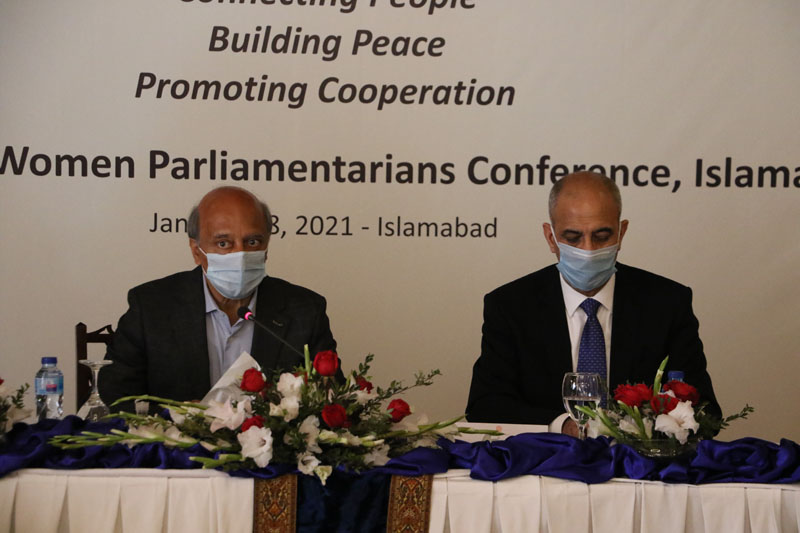
In his address, he also expressed his gratitude towards the Pakistan Government for its continued support and constructive role in the Afghan peace process. He also highlighted the recent Confidence Building Measures (CBMs) enacted by the Pakistan Government in the field of health, education, and scholarships. At the end, the honorable Ambassador, whilst thanking Pakistan for hosting a large number of Afghan refugees, also requested Pakistan’s support in addressing existing issues faced by refugees, and to ensure their safe and dignified return to their homeland.
Member National Assembly Shandana Gulzar, in her keynote address, expressed Pakistan’s deep-seated affection for the Afghans and acknowledgement of their sacrifices. Moreover, she also praised Afghans’ resilience against terrorism during the last four decades. She stated that some elements remain eager in nurturing misunderstandings and distances between Afghanistan and Pakistan. She explained that although war brings with it the potential for wealth creation, both Afghanistan and Pakistan desire to strengthen their economies through the achievement of long-lasting peace. Shedding light on the importance of women parliamentarians’ collaboration, Ms. Gulzar urged that such meetings should be regularly conducted in the future too as their collaboration will aid in strengthening bilateral relations. She suggested that future meetings should have specific agenda points to map pertinent issues and chalk out recommendations. These recommendations can be tabled to other senior decision-makers by these women parliamentarians, allowing for future policy making.
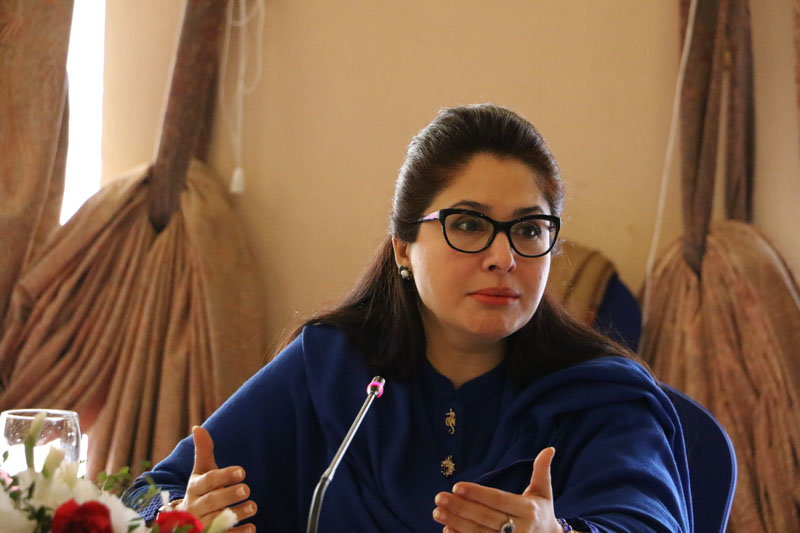
The Afghan head of delegation, Shinkai Karokhail, whilst chairing during the second session on “Role of Afghan women in achieving peace in Afghanistan”, applauded the efforts of CRSS and OESP in making women parliamentarians’ collaboration possible through such conferences. She was of the view that engaging more women in politics will eventually change the dynamics of Afghan politics. Furthermore, she emphasized the importance of women’s role in peace, considering women the most active agents of change in any society. She said that as women from Afghanistan, we expect the region to support Afghan women in their efforts to achieve meaningful inclusion in the peace process. She further added that peace is not the absence of war, in fact, it is about safeguarding human rights and improving quality of life.
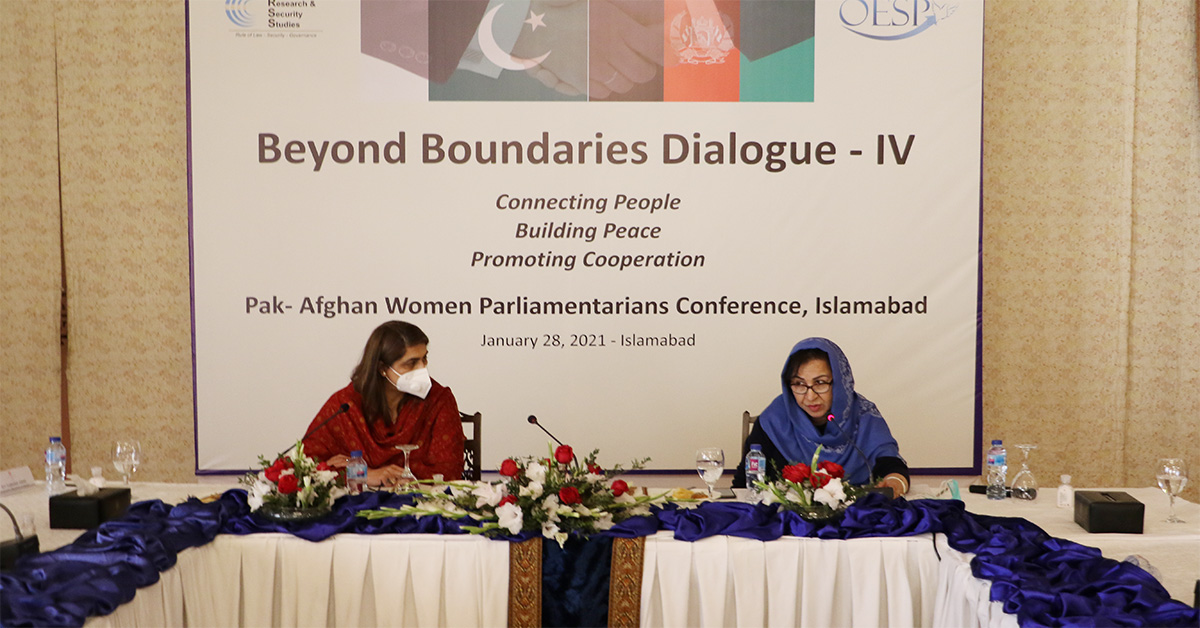
She concluded that peace in Afghanistan will impact the whole region enormously as it will promote regional stability and connectivity.
Stressing the efforts of Afghan women parliamentarians in achieving peace, Fatima Kohestani briefed that Afghan women parliamentarians are very vulnerable, both financially and security-wise. The first wish of Afghan women parliamentarians is to change the lives of Afghan women at the community level. She urged that since Afghan women parliamentarians were not taken seriously due to a widespread patriarchal mindset, they needed support from Pakistani women parliamentarians at platforms such as this one to raise a combined voice for Afghan women. She also mentioned that while women are not included in the peace process both qualitatively and quantitatively, they want to be heard, accepted, and included. She requested the Pakistan Government to invest in the form of increased educational investments in Afghanistan to empower local girls and women.
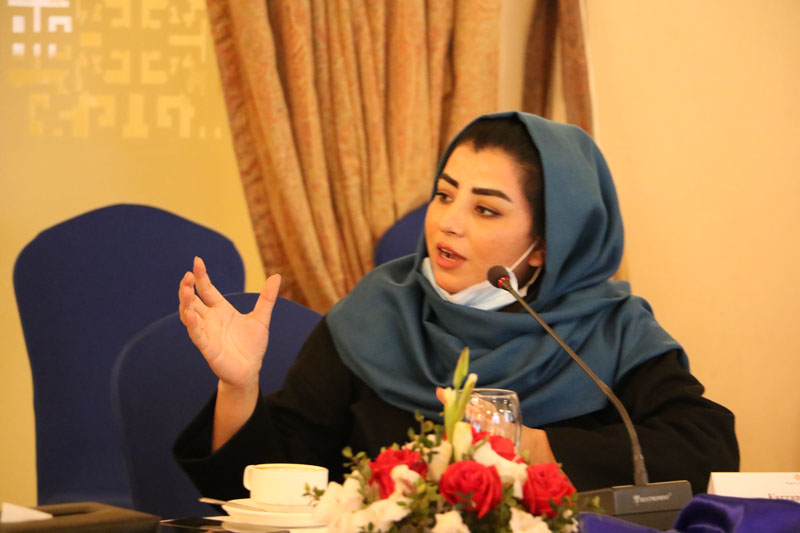
Member Parliament, Farzana Kochai also presented her viewpoint during this session. She said that the definition of peace needs to be clarified first. If peace is the absence of war, it can be achieved easily. But peace in terms of equality, equity, and access to rights, cannot be achieved easily. Enduring peace is possible only through safeguarding human rights. She also requested the Pakistani counterparts to raise their voices to support Afghan women in the peace talks and to compel the perpetrators of the war to include women in the conflict resolution phase. She also supported Ms. Shandana’s idea of continuing these meetings, stating that we should prioritize engaging in such initiatives as a responsibility.
The next session of the conference was chaired by Dr. Nausheen Hamid, Parliamentary Secretary for Ministry of Health, on CBMs enacted by the Pakistan Government for Afghanistan. During her address, Dr. Hamid stated that Pakistan and Afghanistan share health issues due to their geographical proximity. Pakistan has assisted the Afghan Government in the establishment of three hospitals. One in Kabul (Muhammad Ali Jinnah Hospital), another in Logar, and the third in Jalalabad (Nishtar Kidney Hospital). Moreover, Pakistan is also assisting Afghanistan in controlling Polio, by testing drinking water from different sources in Afghanistan. Right now, Pakistan is focusing on providing health insurance to all the citizens of Pakistan and to achieve universal health coverage. She also briefed the audience that Prime Minister Pakistan, Imran Khan, has offered the Afghan Government to set up Shaukat Khanam Hospital in Afghanistan and the feasibility of the project is currently being assessed.
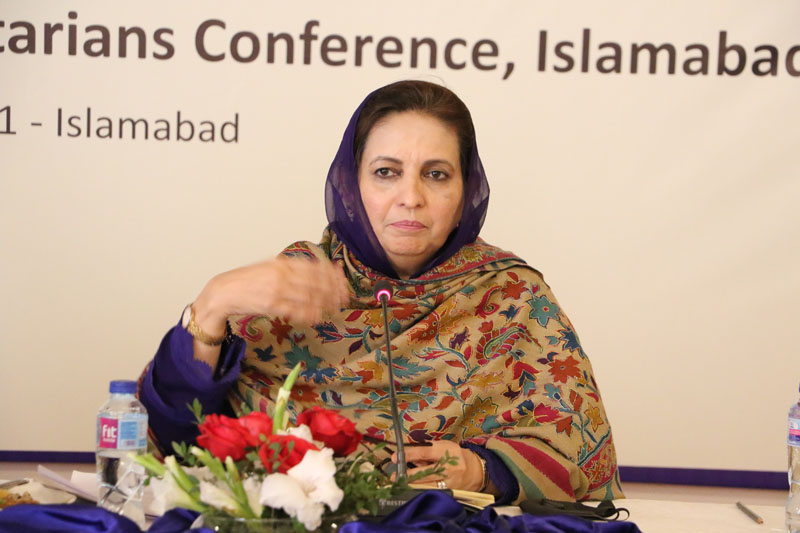
Highlighting the initiatives taken by the Government of Pakistan regarding the COVID-19 pandemic, Dr. Hamid briefed the audience that Pakistan’s strategy of smart lockdowns helped in controlling the coronavirus to a large extent. In the pandemic, Pakistan had to fight on two fronts simultaneously i.e., the disease and the failing economy. Pakistan has achieved a lot by taking this crisis as an opportunity to become self-sufficient in manufacturing health care supplies e.g., PPE, Diagnostic Kits, and Ventilators.
During the open discussion session, MP Kohestani, floated the idea of creating a hospital in the free/shared area where Afghan nationals consult with different visa relaxations, to which Senator Mehar Taj Roghani replied that this idea might not be sustainable in the longer run, however, the hospitals already created with Pakistan’s help can be upgraded. MNA Shandana welcomed the idea of creating hospitals in the border areas e.g., Torkham, Chaman etc.
Ms. Shinkai Karokhail also suggested instituting an exchange programme for specialization by doctors (especially in oncology). Allowing Afghan doctors to do their specialization in Pakistan will not only help in enhancing people-to-people relations but also aid in improving the healthcare system of Afghanistan.
Ms. Shirni Mohsini raised that visa on arrival at the crossing points is still not functional, due to which most of Afghan patients have to travel to India for their treatment, Ms. Shandana ensured to take care of the matter by highlighting it in the upcoming Pak-Afghan Friendship Group Session.
The fourth session of the conference was chaired by Dr. Sania Nishtar, SAPM on Poverty Allevation and Social Safety to the Prime Minister of Pakistan. Dr. Nishtar lauded the conference stating that peer-to-peer learning is highly effective and significant.
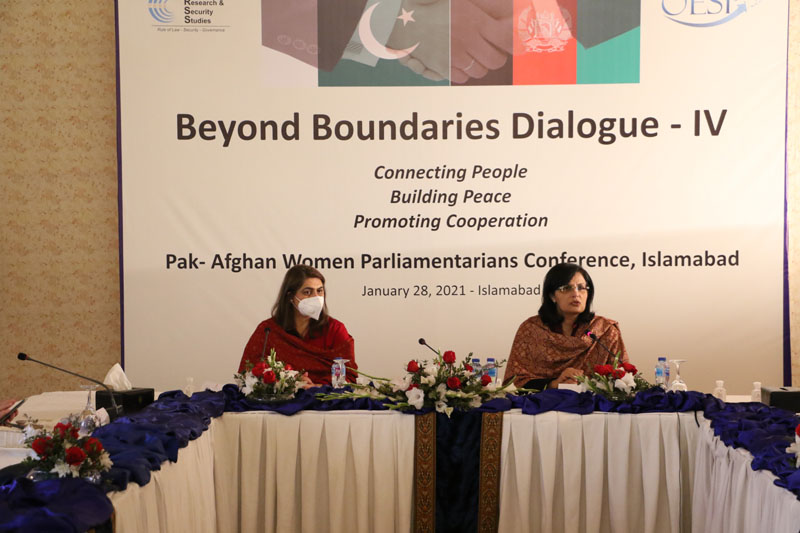
She highlighted that almost all the Government’s programs under the EHSAS are designed on the 50 percent pattern i.e., more than 50 percent benefits are allocated for women. In this regard, the EHSAS Kafalat program is designed 100% for women, EHSAS Bila-Sood Qarza (Interest Free Loan) program has a 50% quota for women, EHSAS Aamdan (Income) program has a 60% quota for women, and EHSAS undergraduate scholarship program has a 50% quota for women.
The Afghan parliamentarians praised Pakistan’s recent initiatives. Ms. Karokhail suggested that in order to grasp the contextual background of these programmes and to replicate such initiatives in Afghanistan, an Afghan Women Affairs Ministry delegation should visit Pakistan to fully understand and learn from these initiatives. Dr. Nishtar welcomed the idea and ensured her complete support in this regard. Dr. Nishtar also stated that Pakistan is making efforts to formally recognize the value of domestic work done by women. Different provinces adopt different legislation for women, later provinces learn from each other and replicate other provinces’ model. Progressive legislation, breaking barriers, defying restrictive cultural norms can help in empowering women, added Dr. Nishtar in her concluding remarks.
MNA Nafeesa Khattak whilst speaking during the session on education collaboration and CBMs informed the participants that Pakistan has implemented the “Single National Curriculum” up to the primary level and will extend it to the secondary level by next year. Furthermore, she informed that we are training the teachers to impart concepts and discourage cramming culture, existing currently in our education system.
Later during this session MNA. Mehnaz Akbar Aziz informed that Pakistan has constituted a special committee on child rights at the Sustainable Development Goals (SDG) headquarters in the National Assembly and is willing to support Afghanistan with any possible assistance in establishing such committees. The participants from both countries unanimously agreed that Pakistan and Afghanistan can work together on education, parliamentary business, and any other sector that Afghanistan wants to focus on.
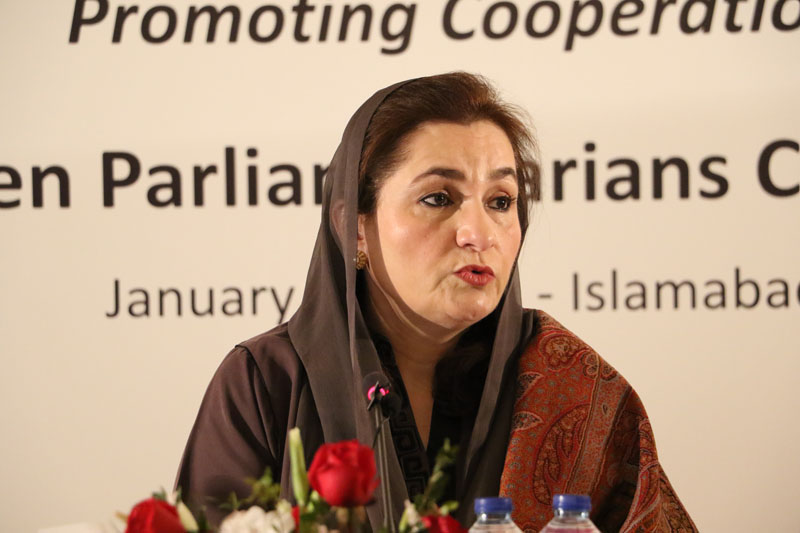
The last session of the conference on “role of women in strengthening bilateral relations and regional economic connectivity” was chaired by Dr. Aisha Ghous Pasha, former Finance Minister of the Punjab Government. She welcomed all Afghan parliamentarians and assured them that through continuous engagements, women parliamentarians of both countries will be able to resolve several issues. She stated that South Asia is the least regionally integrated region in the world. She felt that Pakistan and Afghanistan were too focused on insignificant issues. She added, “No nation can prosper with one wheel working” i.e., only men participating in the economic domain. It is essential for both wheels to run properly in order to flourish. She felt that women should be economically active in a way that suited their own cultural and religious belief systems. Education, skill development, and health were essential for women to be economically active and confident in the public sphere. Finally, she added that both sides should make efforts to ensure national-level budgeting in both countries should be gender sensitive. In addition, with a peace agreement in place, the Afghan Government should prioritize improving the quality of life for all its citizens.
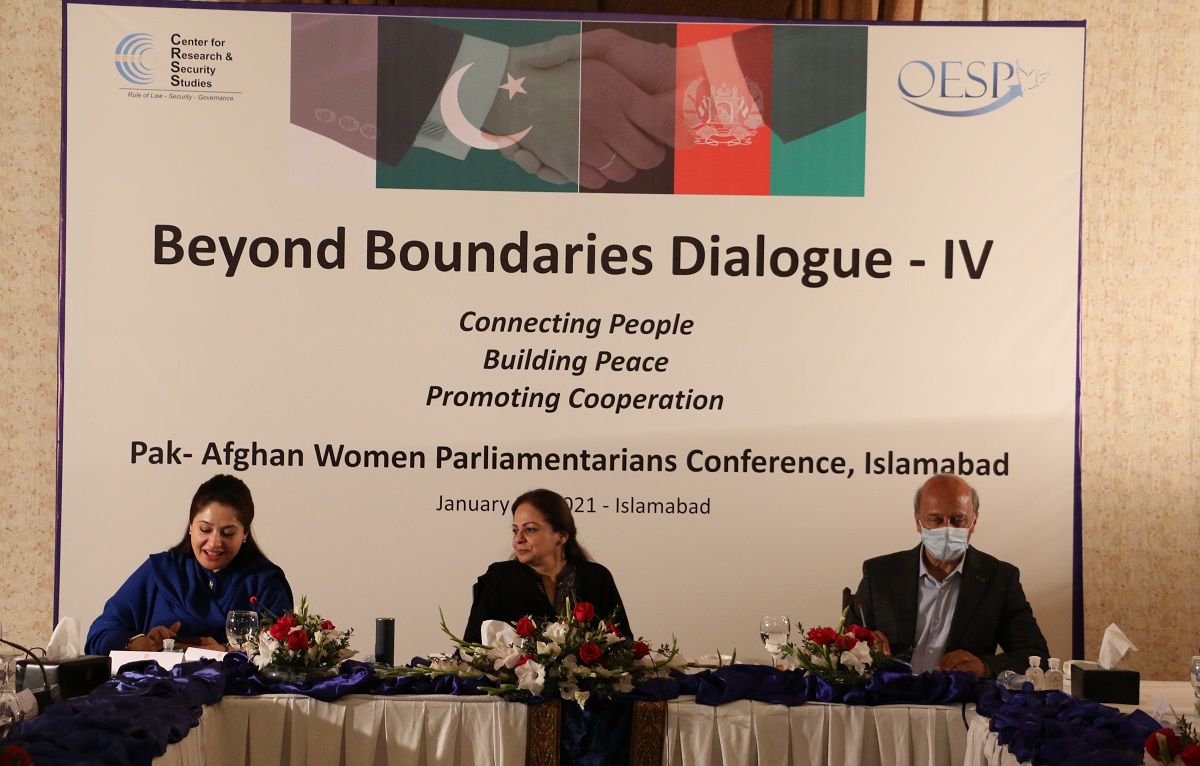
The concluding session was conducted by MNA Shandana Gulzar. She suggested that this group should replicate the model of ‘Doctors Without Borders’ and form a similar group named ‘Women Parliamentarians without Borders’, initially with women parliamentarians from Pakistan and Afghanistan. She also suggested that alongside peace negotiations, women parliamentarians should also highlight the need for development in this region, as sustainable peace can be achieved only through development. She felt that Women parliamentarians should have their own voice, which would rise above all else to safeguard women’s rights in the region.
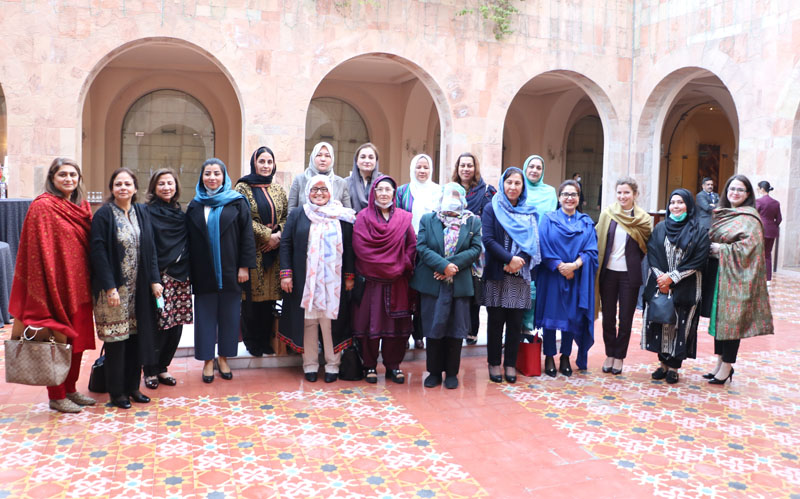
DECLARATION OF JOINT POLICY RECOMMENDATIONS
At the end of the conference, the parliamentarians devised the following joint policy recommendations:
- The participants of the Pak-Afghan Women Parliamentarians conference will establish a group, Women Parliamentarians without Borders, in order to work together on the development front, which will ultimately enhance the Track 1.5/ II diplomacy.
- The Pakistani members will lobby for educational investments in the form of scholarships for Afghan students.
- The members have requested a programme specifically for Afghan doctors to complete medical specialization and further study in Pakistan.
- The members will urge the Pakistan Government to initiate visa relaxations for Afghan patients, including visa on arrival.
- Both countries’ members have agreed on the continuation of these meetings for at least a period of one year through such fora – one meeting per month either physical or virtual which will be organized together by CRSS and OESP– can assist in identifying problems and finding solutions mutually.
- Efforts will be made for the Afghan Minister for Women Affairs to visit Pakistan to understand existing initiatives in Pakistan.
- Pakistani members will urge their Government to establish hospitals at the Chaman and Torkham crossing points.
- Both groups will advocate that the development of national budgets should be more gender sensitive, in both Pakistan and Afghanistan.
- Both groups agreed on the establishment of a Young Pak-Afghan Parliamentary Forum to work for the empowerment of youth in both countries.
